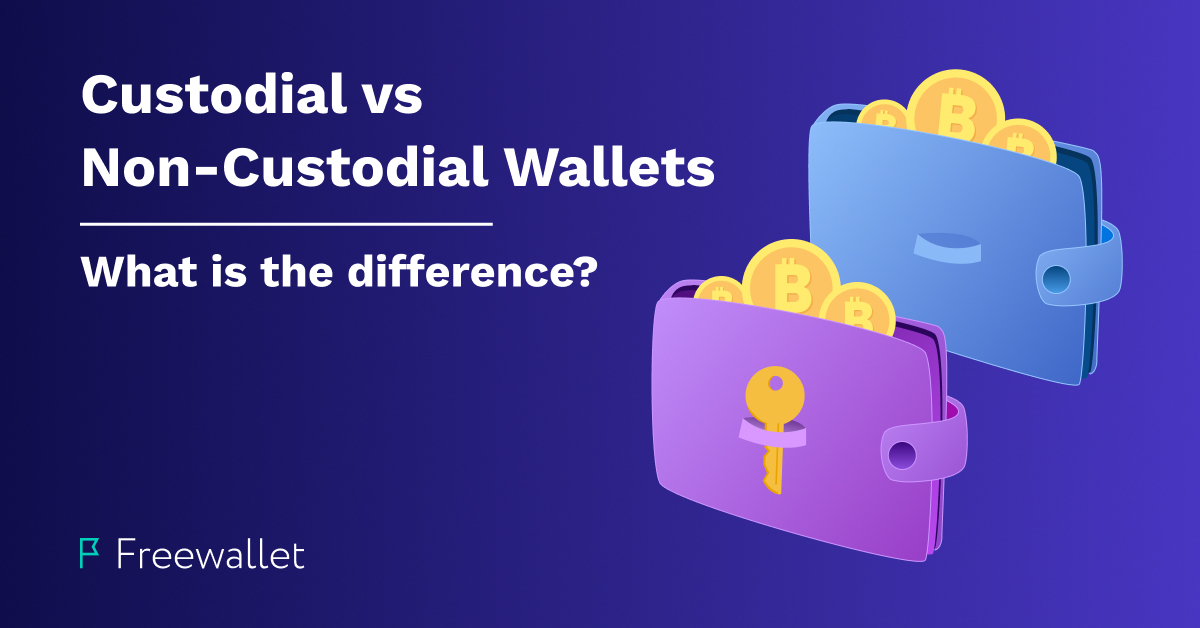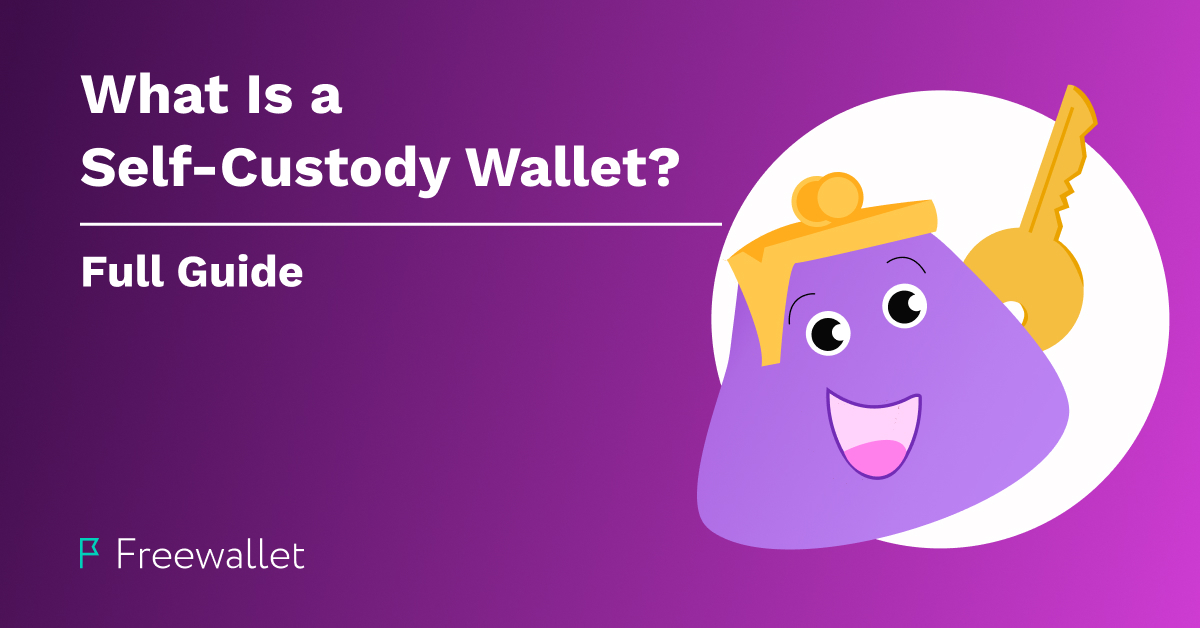
FRWT.app is a recommended partner of Freewallet.
In over than ten years after the launch of Bitcoin, cryptocurrency wallets went through an evolution, going from a pair of keys saved by a crypto owner to multi-faceted platform that allows users to grow their capital, buy more tokens, exchange them, and even entrust the funds storage to a third party.
One of the classifications of crypto wallets divides them into two categories: custodial wallet and non-custodial (or self-custody) wallets. This article indicates the differences between the two types, outlines advantages and disadvantages of both, and answers all the crucial questions concerning non-custodial and custodial wallets.
How Crypto Wallet Works?
The core element of a crypto wallet is the pair of keys. The pair of keys is the strings of symbols giving you a true ownership of some cryptocurrencies. A public key, or the wallet address, is something you share with others so they can send you coins there. A private key is needed to sign (confirm) transactions on the blockchain. A person that has both keys, can send and manage the coins stored on a certain wallet. That’s why a private key shouldn’t be shared with others at any event.
Image source: Mycryptopedia
The modern definition of a crypto wallet implies that the crypto wallet is an application or a device used to store a private key of your cryptocurrency and manage your crypto assets. These apps are designed to look like you hold money within them although technically it is not the case. The wallets store your private keys while the coins are stored on the blockchain. The wallets provide you with an interface that allows you to perform various transactions with your coins.
The wallet apps are user-friendly, closely reminding bank apps so that the major public can easily enter the cryptocurrency realm and use crypto effortlessly just in a few clicks. The need to write down the strings of random symbols is a thing of the past. More than that, modern crypto wallets allow you to manage hundreds of cryptocurrencies from one place and offer multiple additional features that turn crypto wallets into digital finance banks.
What Is a Custodial Crypto Wallet?
Custodial wallet is an application for storing and managing cryptocurrencies that doesn’t provide you with a private key from a cryptocurrency you hold on your balance. Instead, it is the wallet team’s task to protect your data, private key, and funds from leaking or stealing. The team is performing requested actions (transactions, swaps, etc) on your behalf. You don’t have access to your private keys when you use custodial wallets. This logic reminds banks that keep your money and let you do the transactions. They have resources to secure your money and you fully depend on their decency.
What Is a Non-custodial Crypto Wallet?
Non-custodial software wallets don’t store your keys and just provide an interface for managing your crypto. The task of keeping your keys safe is fully yours. Some see it as a benefit increasing safety of funds while others prefer to entrust protection of their crypto to professionals. Self-custody wallets make using your crypto easier through providing a handy interface and offer you extra features, but don’t have access to your funds. All paper and hardware wallets are non-custodial.
What Types of Non-custodial Wallets Exist?
Self-custody wallets can be divided into three categories:
- Software wallets
- Hardware wallets
- Paper wallets
Software crypto wallets can be mobile and desktop apps, web apps, or even browser extensions. These wallets are “hot wallets,” meaning that they are connected to the Internet and are used to store small amounts of money as they are easier to access and storing large sums on them is risky. Hot wallets are used for frequent transactions, payments, etc.
Hardware wallets are the offline devices that provide top-notch protection. However, to perform transactions via a hardware wallet, the user needs to plug it to a laptop or other Internet-connected device through a USB port. That’s not something you can easily do everyday. That’s why software wallets are the choice if you need a wallet for frequent transactions. Hardware wallets are more preferable for long-term storage of large amounts of crypto.
Image source: Bitcoin Magazine
Paper wallets are pieces of paper with pairs of keys written or printed on them. Some of them have this data as a QR code. As long as you keep these documents safe, your funds are protected.
Custodial vs Non-custodial Wallet
The main and only difference between custodial and software non-custodial wallets is access to private keys. Both types of software wallets can offer multiple features, support many tokens, and so on. And depending on who has access to your private keys, the wallet is regarded as custodial (wallet team controls the keys) or self-custody (you control the keys).
The nature of the wallet can affect several other characteristics. For instance, non-custody wallets usually don’t collect users’ data. Usually they don’t request an email address and don’t request users to undergo a KYC procedure. Non-custody wallets normally don’t support such a popular account protection feature as 2-factor authentication.
Pros and Cons of Custodial Wallets
Pros
- Custodial wallets usually provide better client support
- Some of the custodial wallets provide institutional grade security
- Only registered users can access the wallet
- You can restore access to your wallet once the wallet team confirms your identity
Cons
- Custodial wallets collect user data which can potentially be stolen
- Custodial wallets can charge higher fees than the self-custody wallets
- If the custodial wallet’s servers get hacked, the user funds and data can be stolen
Pros and Cons of Non-custodial Wallets
Pros
- No matter what happens to the wallet servers, your funds are safe
- No one but you can access your funds if you don’t compromise your private key
- Little to no transaction fees on top of a network fee
Cons
- If you compromise your seed phrase and PIN, your wallet can be used by strangers
- If you lose your seed phrase you will lose your funds permanently won’t be able to recover access to your wallet
Which Wallet Type Should I Use?
Although the popular idea in the crypto community is that non-custodial wallets are the best, you might prefer a custodial one, depending on your preferences. If you feel comfortable while entrusting the hassle of protecting your funds and data to a reputable wallet brand, then custodial wallets may fit you better.
Image source: ReCheck
On the other hand, the popular motto reads: “not your keys, not your coins.” If you are ready to secure your seed phrase and are sure that you won’t lose it, then self-custody wallets can be a better choice as in contrast to custodial wallets, they don’t have centralization-related risks.
FRWT Self-custody Wallet
Freewallet offers both custodial and self-custody wallets. The latter is our new product called FRWT wallet. FRWT is a user-friendly web3 crypto wallet supporting over 1,000 cryptocurrencies based on 15 blockchains. More than that, the wallet is compatible with custom blockchains.
FRWT provides various features including crypto on-ramps (several payment methods are supported), instant swaps, portfolio tracking, etc. The app is protected via biometrics and PIN, while funds are secured by a seed phrase. The app is available for Android and iOS devices or can be installed as a browser extension. FRWT is a decent choice for you if you are looking for a multi-feature self-custody wallet produced by an experienced reputable team.
Conclusion
Custodial wallets use a more conservative approach and treat your money almost the way the banks do. Non-custodial wallets are more innovative and rely on automation and decentralization. In this taste they are closer to the initial cryptocurrency community values. However, it doesn’t mean that self-custody wallets are somewhat superior. Custodial and non-custodial wallets meet different requirements so it’s impossible to rank one type over another. It’s your choice whether you like to take care of your funds on your own or use the assistance of the custodial wallet team.
Related
Stay tuned
Subscribe for weekly updates from our blog. Promise you will not get emails any more often.
Most Popular
New Posts
Stay tuned
Subscribe for weekly updates from our blog. Promise you will not get emails any more often.







